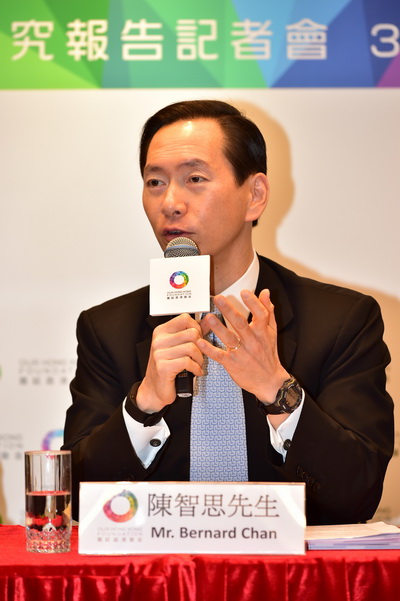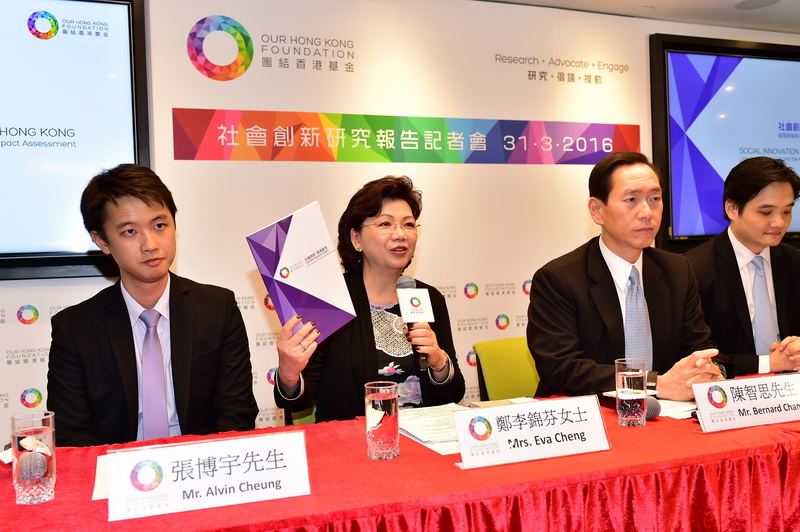OHKF launches Social Innovation Research Report
recommends five new initiatives:
Including Social Impact Assessment and Annual Survey for Data of Social Impact
(31 March 2016, Hong Kong) Our Hong Kong Foundation (OHKF) today publicizes its research report on “Social Innovation”, recommending that the Hong Kong Government start five new initiatives in several areas.
Topping the to-do list is launching a mechanism for assessing the social impact of public policies, so that their actual influences on society and people’s livelihood can be evaluated holistically. It is suggested that the Government set up a task-force to carry out such assessment so as to help enhance the policies’ effectiveness.
The report also recommends that the Government conduct a large-scale Annual Survey for Data of Social Impact to evaluate the impact of the policies, which in turn, will bring about happy lives for Hong Kong people.
The report, focused on “Social Innovation”, is the third one that OHKF has publicized so far. It was prepared by the Foundation’s research team, led by Mr Bernard Chan, member of the Government’s Executive Council and member of Research Council of the Foundation, with contributions to the research effort from Dr KK Tse, Professor Emeritus in the Business School of Hong Kong Baptist University.

Mrs Eva Cheng, OHKF Executive Director; Mr Bernard Chan, member of the Government’s Executive Council and member of Research
Council of the Foundation; Mr Stephen Yuen-shan Wong, OHKF Deputy Executive Director and Head of Public Policy;
Dr KK Tse, Professor Emeritus in the Business School of Hong Kong Baptist University.
“Social Innovation means helping to solve social problems with innovative ideas and in unconventional ways,” said Mr Chan in his speech at the news conference. “To gain better results of the combined manpower, material and capital, namely to enhance the effect or efficiency of those input resources, we need ‘Social Impact Assessment’, which is an outcome-based tool of evaluation.”
“The Government is the chief stakeholder in social impact assessment,” he added. “By wisely using the tool, it would greatly foster social innovation and improve the development of policies.”

different demands of members of public. I look forward to
the effort of the government in building up a set of assessment
standard, and carrying out assessments on the efficiency
of new projects,” said Mr Bernard Chan, member of
the Government’s Executive Council.
Promoting Social Impact Assessment
The report suggests that government departments should heighten their awareness of, and support for, Social Impact Assessment, and they should set up evidence-advisory units that would provide research findings, toolkits, and guidelines. For instance, departments in charge of the Government’s finance, such as the Treasury and the Audit Commission, and those working closely with the social sector and social innovators, such as the Social Welfare Department and the Home Affairs Department, should try to grasp the concept of Social Impact Assessment and make a good use of that mechanism.
Reviewing procurement policies
The report also recommends that the Government reviews its procurement policies. Besides the cost in money terms and the past experience, the Government should consider the suppliers’ social values as shown in things, or lack thereof, like products made from environment-friendly materials and employment of handicapped people. With such reviewing, the policies would enable social enterprises to enjoy equal opportunities when bidding for government contracts.
Boosting cooperation between businesses and social innovators
The report calls for closer co-operation between businesses and social innovators, which would encourage resourceful enterprises and business people to work with relatively resource-poor social enterprises or social innovators. OHKF is willing to join and support such co-operation, with its constant efforts at promoting a “Bees and Trees” platform for both sides working together.

innovation are to create a more harmonious society and bring more happiness to the people.”
Providing “social financing” loans
The report also recommends that the Government grant “Social Financing” loans to those social enterprises that are well-run but short of cash. Such arrangements would improve their cash flows, thus enabling them to carry out contracts for large-volume orders, expand services they provide, or raise the efficiency of their operations. In short, this would help social enterprises to grow healthily.
Collecting data for Social Impact
Finally, the report recommends that the Government conduct an Annual Survey for Data of Social Impact in order to measure the impact of policies on the public which can be a complement to economic statistics, such as GDP. The surveys’ results should be made public, as this would also help the Government to assess the value of its policies in society.



